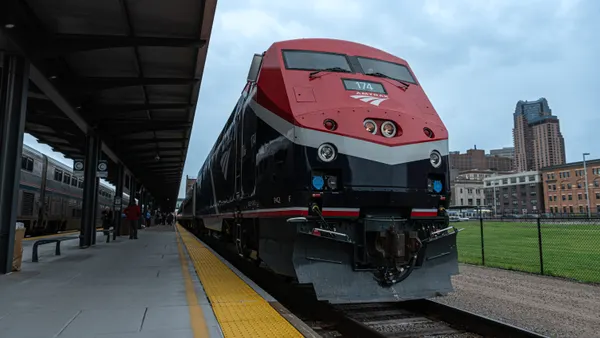Dive Brief:
- Local governments should regulate dockless bike-share, integrate it into their public transportation systems and manage the streetscape better, according to a new report by the Institute for Transportation and Development Policy (ITDP).
- Five elements — transit integration, data sharing, public space management, user protections and dedicated staff — will help dockless bike-share do well in cities.
- "The best transit innovations — especially those that are privately operated — offer riders convenient, affordable options for getting where they need to go," ITDP senior research associate Dana Yanocha said in a statement. "Local governments that have viewed dockless bike-share as an extension of their transit systems and introduced some form of regulation have seen ridership flourish as a result."
Dive Insight:
Since they burst onto the scene earlier this year, dockless bikes and scooters have given city leaders plenty of headaches as they try and deal with this new phenomenon, including what to do with sidewalk clutter and how to deal with the safety of all road users. That safety issue reared its head earlier this week in downtown Nashville, TN after two women riding the Bird dockless scooters were struck by a hit-and-run driver.
In its report, ITDP highlighted success stories in Dublin and Guangzhou, China, where both issued guidelines and a code of conduct to control dockless bike-share. And in the United States, the organization said Washington, DC is a good example of a city that is trying to phase in dockless, but recognizes there is still work to do — data analysis, for example —as it extends its pilot program.
The report urges cities to lower barriers to biking by making it part of mass transit and ensuring equitable distribution, while asserting companies should be made to share trip data and other statistics with governments when requested. In addition, the report suggests dedicated parking zones to manage public space, while the companies should act responsibly to promote safety and cities should consider hiring dedicated staff to oversee everything and enforce regulations.
So far, cities have struggled to deal with the influx of shared dockless bikes and scooters, with impoundment from the likes of Austin, TX and San Francisco, while other cities like Dallas have tried to slow the companies’ growth down temporarily so they can debate and approve regulations. This report, coupled with previous cities’ experiences, should serve as a call to action for local governments to take a leadership role on this issue and see it as another complementary option for residents to get around with.
But ITDP researchers said governments should remember that dockless is a recent innovation and that there may be growing pains as companies and city officials learn to work together. The organization warned though that the startups should be prepared to cooperate fully, or else cities would be advised to take their business elsewhere. "If operators don’t want to work with cities to meet these standards and provide a high-quality service for users, then cities should consider looking at alternatives for providing bike-share," Yanocha said.












